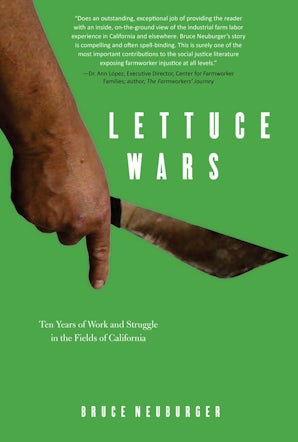Lettuce Wars reviewed on Counterfire

Lettuce Wars: Ten Years of Work and Struggle in the Fields of California
FRIDAY, 28 JUNE 2013 17:42
WRITTEN BY ADAM TOMES
An account by a participant of Californian agricultural workers’ struggles raises important questions about exploitation, immigration and the limitations of the great United Farmworkers union
Bruce Neuburger, Lettuce Wars: Ten Years of Work and Struggle in the Fields of California. (Monthly Review Press 2013), 414pp.
This political memoir of workers’ struggles in the fields of California raises the key question of whether the ‘American Way of Life was, and is, only possible because the intense, cruel exploitation of some sustains the privileged lives of others’ (p.121).
Neuburger’s book is part political memoir and part political analysis of the struggle for rights in the 1970s in the vegetable and fruit fields of California, and is a valuable contribution to the history of American political and economic radicalism. It feels like an update on East of Eden, by John Steinbeck, set in Salinas, California. Or perhaps more importantly it is a memoir that reflects the story of workers’ courage and resistance that Steinbeck creates in his much underrated novel, In Dubious Battle. This book will certainly nestle comfortably on my book shelves between these two novels and The Bending Cross, A Biography of Eugene V Debs, by Ray Ginger, which illustrates the same political radicalism in the late nineteenth and early twentieth century. It illustrates a history of the United States which is ‘more arrogant invader than beacon of freedom, more oppressor and aggressor than champion of human rights’ (p.266).
The book is based around Neuburger’s actual experiences in the fields in the 1970s. Through the vivid descriptions and humorous prose, you almost come to feel the intense pain of the work in your fingers, your back and the sweat that was part of his ‘salty anointment’ into contract work (p.55). At the same time, the real pain is felt through the ‘workers who were dehumanised and demoralised by extreme forms of exploitation’ (p.102). It really exposes the plight of the farm worker and the exploitation of the casual worker in the 1970s, which seem to act almost as a template for the neoliberal theory of employment across most sectors in 2013. As such, the story has real resonance for the battles being faced by workers across industries and across the globe.
One of the highlights of the book is the vast array of bit part characters. The author has a fantastic way of introducing us to and helping us to expand our understanding of the workers in the fields. Many of course in this story are workers who have come across from Mexico. It really personalises the book as we get to understand their characters, motivations for seeking work in the USA, their culture and view of the world, and brings to life the poverty in which they live. The characters of Pablo and Maria really stand out as does, in particular, their view of the political system which is ‘puro convenencia’ or pure self-interest. In this way, the book is also the story of his exploration of an unfamiliar culture, its food and language…
Read the entire review on Counterfire

